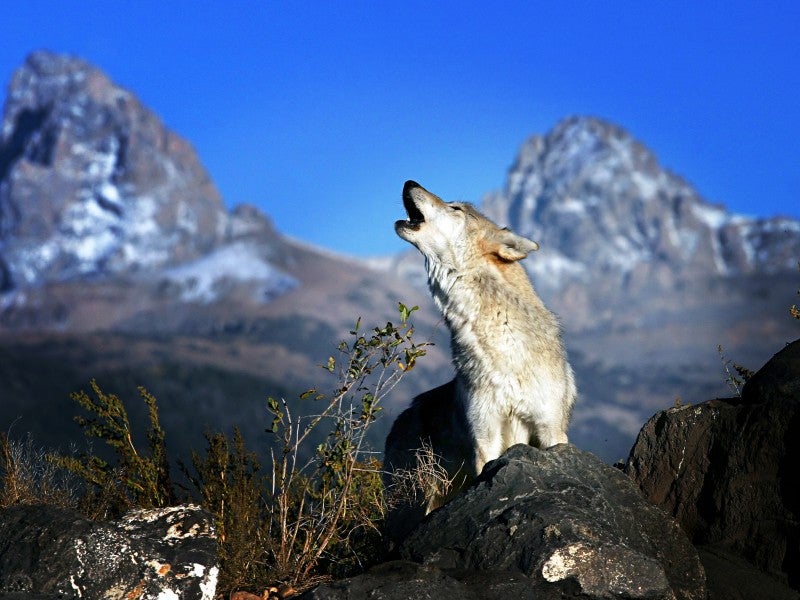What’s Hiding in the Budget Bill? Sneak Attacks on Wolves, Trees and Water
Amendments pushed by polluters would override years of work from federal agencies, decisions by judges, and public comments from millions of Americans.

This page was published 8 years ago. Find the latest on Earthjustice’s work.
Five key environmental protections are on the verge of being wiped out by a sneaky procedural move in Washington, D.C.
Now that Congress has finally agreed to an overall budget level for 2018, it is writing a massive final must-pass spending bill to enact before its March 23 deadline. The allies of polluting industries have added over 80 anti-environmental “riders” on to the multiple bills that will be used to negotiate this final funding measure. Riders are pieces of legislation that often would not gain support on their own but get a free ride as amendments on a larger bill that has general support.
These amendments would override years of work from federal agencies, decisions by judges, and public comments from millions of Americans. And this could happen with little debate if Congress doesn’t hear from its constituents soon.
Two riders attempt to open Alaska’s Tongass National Forest to logging after Earthjustice fought industry over this for 16 years and won decisively in court. The forest is home to a third of the world’s old-growth temperate rainforest and to more bald eagles than anywhere else on the planet. Courts have kept logging out of this wild place by upholding the Roadless Rule, one of the most significant forest conservation measures of the last century that protects nearly 50 million acres of wild national forest lands nationwide from new logging roads and logging.
For three years Earthjustice lobbied the Clinton administration to create the rule and to include the Tongass in it. During the process, the administration held more than 600 public hearings, and received more than 1.6 million public comments in a dramatic show of popular support.
Industry challenged the rule in court, touching off a decades-long fight involving Earthjustice attorneys from Denver, Bozeman, Seattle and Juneau offices, dozens of courtrooms and judges, and thousands of hours of legal wrangling. When industry lost its final appeal last year, Earthjustice attorney Tom Waldo commented, “when we first started this, it never crossed my mind we would still be litigating the rule 16 years later.”
Now, the logging industry is doing an end run around all of that with two riders that would remove Roadless Rule protections from 9.5 million acres of the Tongass.
Here are four other sneak attacks on key environmental protections:
- Repealing Clean Water Protections: Another rider seeks to permit the Environmental Protection Agency and the Army Corps of Engineers to repeal the 2015 Clean Water Rule without regard to any otherwise applicable statute or regulation. The Clean Water Rule ensures Clean Water Act protections are applied to a variety of water bodies, including the kinds of streams that feed into public water supplies serving one in three Americans. This rider aims to exempt the repeal of this popular rule from public and legal scrutiny.
- Attacking Clean Air Protections: One rider seeks to permanently block or delay implementation of the 2016 national ozone standard rule that would reduce the amount of smog pollution that our families and communities are exposed to. Unhealthy levels of ozone (smog) causes breathing problems, asthma, heart attacks and premature death.
- Targeting Endangered Species: Several riders target crucial endangered species protections. One of these anti-wildlife riders would block federal protections for wolves in Wyoming and three Midwest states and preclude judicial review of the two agency wolf delisting rules at issue; another rider would prohibit the U.S. Fish and Wildlife Service from protecting the greater sage-grouse under the Endangered Species Act; and yet another rider would allow federal agencies to ignore potentially life-saving information impacting endangered species.
- Blocking funding for Methane Waste Rule: This rider seeks to prohibit funds from being used to implement the Bureau of Land Management’s (BLM) Methane Waste Rule, a commonsense, cost-effective safeguard. BLM’s rule simply requires the oil and gas industry to use cost-effective technologies and practices to reduce venting and flaring as well as find and fix leaks from oil and gas infrastructure on public lands—protecting taxpayers, public health and the environment.
Established in 1989, Earthjustice's Policy & Legislation team works with champions in Congress to craft legislation that supports and extends our legal gains.